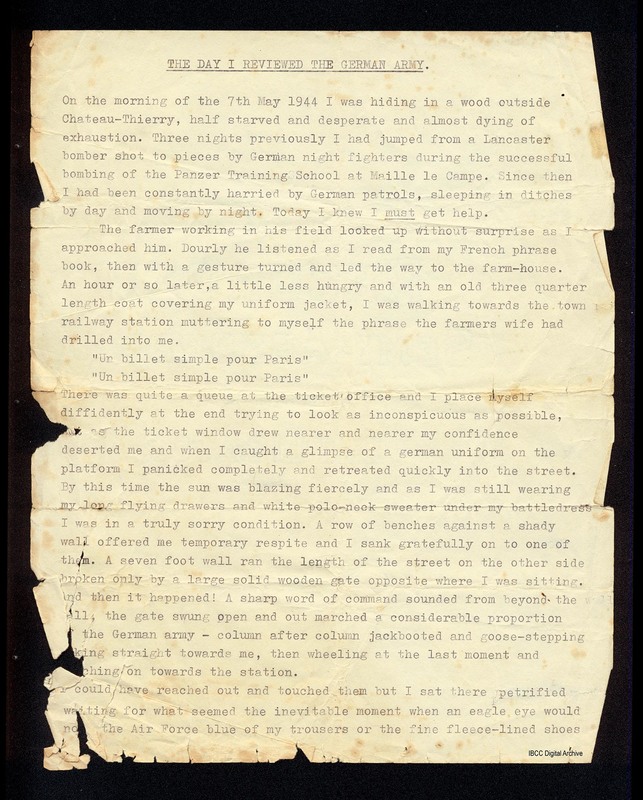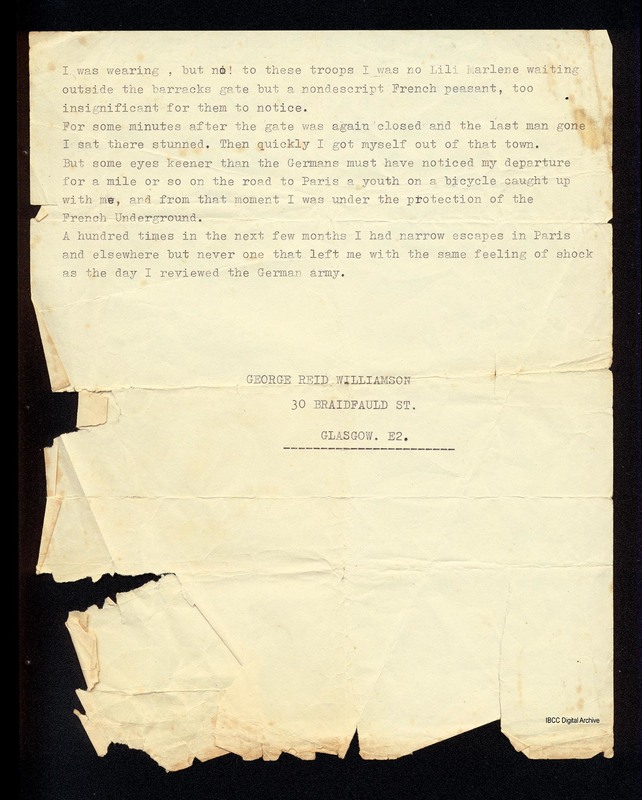The day I reviewed the German army
Title
The day I reviewed the German army
Description
The memoir details the events after Sergeant George Reid Williamson baled out of his Lancaster over Chateau-Thierry. After hiding in a wood for a few days, he met a local farmer who took him back to the farmhouse for food and a large overcoat. While trying to reach Paris by train pretending to be a French peasant he narrowly escaped capture while hiding close to a German unit. He quickly left the town and encountered a French boy riding a bicycle, who put him under the protection of the Resistance.
Creator
Coverage
Language
Format
Two page typewritten memoir
Publisher
Rights
This content is available under a CC BY-NC 4.0 International license (Creative Commons Attribution-NonCommercial 4.0). It has been published ‘as is’ and may contain inaccuracies or culturally inappropriate references that do not necessarily reflect the official policy or position of the University of Lincoln or the International Bomber Command Centre. For more information, visit https://creativecommons.org/licenses/by-nc/4.0/ and https://ibccdigitalarchive.lincoln.ac.uk/omeka/legal.
Contributor
Identifier
BWilliamsonGRWilliamsonGRv1
Transcription
[underlined] THE DAY I REVIEWED THE GERMAN ARMY. [/underlined]
On the morning on the 7th May 1944 I was hiding in a wood outside Chateau-Thierry, half starved and desperate and almost dying of exhaustion. Three nights previously I had jumped from a Lancaster bomber shot to pieces by German night fighters during the successful bombing of the Panzer Training School at Maille le Campe [Mailly-le-Camp]. Since then I had been constantly harried by German patrols, sleeping in ditches by day and moving by night. Today I knew I [underlined] must [/underlined] get help.
The farmer working in his field looked up without surprise as I approached him. Dourly he listened as I read from my French phrase book, then with a gesture turned and led the way to the farm-house.
An hour or so later, a little less hungry and with an old three quarter length coat covering my uniform jacket, I was walking towards the town railway station muttering to myself the phrase the farmers wife had drilled into me.
“Un billet simple pour Paris”
“Un billet simple pour Paris”
There was quite a queue at the ticket office and I place myself diffidently at the end trying to look as inconspicuous as possible, but as the ticket window drew nearer and nearer my confidence deserted me and when I caught a glimpse of a german [sic] uniform on the platform I panicked completely and retreated quickly into the street. By this time the sun was blazing fiercely and as I was still wearing my long flying drawers and white polo-neck sweater under my battledress I was in a truly sorry condition. A row of benches against a shady wall offered me temporary respite and I sank gratefully on to one of them. A seven foot wall ran the length of the street on the other side broken only by a large solid wooden gate opposite where I was sitting. And then it happened! A sharp word of command sounded from beyond the wall, the gate swung open and out marched a considerable proportion of the German army – column after column jackbooted and goose-stepping making straight towards me, then wheeling at the last moment and marching on towards the station.
I could have reached out and touched them but I sat there petrified waiting for what seemed the inevitable moment when an eagle eye would notice the Air Force blue of my trousers or the fine fleece-lined shoes
[page break]
I was wearing, but no! to these troops I was no Lili Marlene waiting outside the barracks gate but a nondescript French peasant, too insignificant for them to notice.
For some minutes after the gate was again closed and the last man gone I sat there stunned. Then quickly I got myself out of that town. But some eyes keener than the Germans must have noticed my departure for a mile or so on the road to Paris a youth on a bicycle caught up with me, and from that moment I was under the protection of the French Underground.
A hundred times in the next few months I had narrow escapes in Paris and elsewhere but never one that left me with the same feeling of shock as the day I reviewed the German army.
GEORGE REID WILLIAMSON
30 BRAIDFAULD ST.
[underlined] GLASGOW. E2. [/underlined]
On the morning on the 7th May 1944 I was hiding in a wood outside Chateau-Thierry, half starved and desperate and almost dying of exhaustion. Three nights previously I had jumped from a Lancaster bomber shot to pieces by German night fighters during the successful bombing of the Panzer Training School at Maille le Campe [Mailly-le-Camp]. Since then I had been constantly harried by German patrols, sleeping in ditches by day and moving by night. Today I knew I [underlined] must [/underlined] get help.
The farmer working in his field looked up without surprise as I approached him. Dourly he listened as I read from my French phrase book, then with a gesture turned and led the way to the farm-house.
An hour or so later, a little less hungry and with an old three quarter length coat covering my uniform jacket, I was walking towards the town railway station muttering to myself the phrase the farmers wife had drilled into me.
“Un billet simple pour Paris”
“Un billet simple pour Paris”
There was quite a queue at the ticket office and I place myself diffidently at the end trying to look as inconspicuous as possible, but as the ticket window drew nearer and nearer my confidence deserted me and when I caught a glimpse of a german [sic] uniform on the platform I panicked completely and retreated quickly into the street. By this time the sun was blazing fiercely and as I was still wearing my long flying drawers and white polo-neck sweater under my battledress I was in a truly sorry condition. A row of benches against a shady wall offered me temporary respite and I sank gratefully on to one of them. A seven foot wall ran the length of the street on the other side broken only by a large solid wooden gate opposite where I was sitting. And then it happened! A sharp word of command sounded from beyond the wall, the gate swung open and out marched a considerable proportion of the German army – column after column jackbooted and goose-stepping making straight towards me, then wheeling at the last moment and marching on towards the station.
I could have reached out and touched them but I sat there petrified waiting for what seemed the inevitable moment when an eagle eye would notice the Air Force blue of my trousers or the fine fleece-lined shoes
[page break]
I was wearing, but no! to these troops I was no Lili Marlene waiting outside the barracks gate but a nondescript French peasant, too insignificant for them to notice.
For some minutes after the gate was again closed and the last man gone I sat there stunned. Then quickly I got myself out of that town. But some eyes keener than the Germans must have noticed my departure for a mile or so on the road to Paris a youth on a bicycle caught up with me, and from that moment I was under the protection of the French Underground.
A hundred times in the next few months I had narrow escapes in Paris and elsewhere but never one that left me with the same feeling of shock as the day I reviewed the German army.
GEORGE REID WILLIAMSON
30 BRAIDFAULD ST.
[underlined] GLASGOW. E2. [/underlined]
Collection
Citation
George Reid Williamson, “The day I reviewed the German army,” IBCC Digital Archive, accessed August 24, 2024, https://ibccdigitalarchive.lincoln.ac.uk/omeka/collections/document/282.
Item Relations
This item has no relations.


